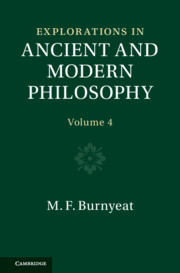Book contents
- Explorations in Ancient and Modern Philosophy
- Explorations in Ancient and Modern Philosophy
- Copyright page
- Contents
- Illustrations
- Preface
- Acknowledgements
- Abbreviations
- Introduction
- Part I Ontology and epistemology
- Part II Physics and optics
- Chapter 8 ΕΙΚΩΣ ΜΥΘΟΣ
- Chapter 9 Aristotle on the foundations of sublunary physics
- Chapter 10 Archytas and optics
- Chapter 11 ‘All the world’s a stage-painting’: scenery, optics, and Greek epistemology
- Bibliography
- Index locorum
Chapter 9 - Aristotle on the foundations of sublunary physics
from Part II - Physics and optics
Published online by Cambridge University Press: 24 March 2022
- Explorations in Ancient and Modern Philosophy
- Explorations in Ancient and Modern Philosophy
- Copyright page
- Contents
- Illustrations
- Preface
- Acknowledgements
- Abbreviations
- Introduction
- Part I Ontology and epistemology
- Part II Physics and optics
- Chapter 8 ΕΙΚΩΣ ΜΥΘΟΣ
- Chapter 9 Aristotle on the foundations of sublunary physics
- Chapter 10 Archytas and optics
- Chapter 11 ‘All the world’s a stage-painting’: scenery, optics, and Greek epistemology
- Bibliography
- Index locorum
Summary
The relationship between Book I of Aristotle’s De Generatione et Corruptione to the rest of his writings on the physical world has been found puzzling. Aristotle’s first statement of its scope promises an account of very general principles of explanation. But the actual focus seems very restricted: theory of elements and of homoeomerous mixture. This study proceeds by examination of cross-references to and from other Aristotelian treatises. These reveal the reading order – the order of argument and exposition – that Aristotle intended for them. GC I presupposes readers already familiar with the cosmology and conceptual system expounded in the Physics, while in the other physical treatises the basic ideas of GC 1 are adapted and refined in explanations of more complex physical entities. GC 1 in fact provides three kinds of foundation: physical, conceptual, and teleological. The order Aristotle insists upon is directed towards a definite goal, the understanding of life and living things. It is not merely pedagogical. More likely it reflects a cosmic scale of values which grades living things as better than non-living, and knowledge of better things as a finer, more valuable kind of knowledge.
Keywords
Information
- Type
- Chapter
- Information
- Explorations in Ancient and Modern Philosophy , pp. 286 - 304Publisher: Cambridge University PressPrint publication year: 2022
